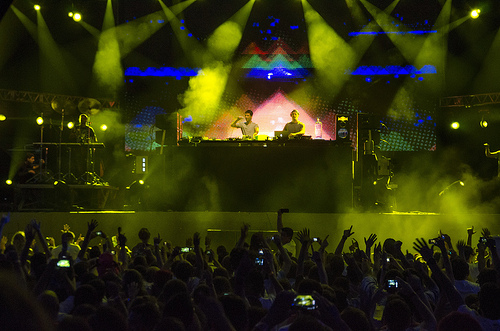Like most music genres, dance can trace its roots far back to the beginning of the 20th century. However, it is only in recent years that dance has truly emerged to become one of the most popular musical styles in the world.

1970s & The Birth of Dance
Dance music as we know it today came to the fore in the 1970s thanks to legendary group Kraftwerk, who are widely credited with introducing dance music to the United Kingdom during a 1975 appearance on the science show Tomorrow’s World, where they performed their 1974 hit Autobahn.
1977 was perhaps the biggest year of all during the early days of dance; Donna Summer released I Feel Love, one of the first disco tracks to be produced with a 100% electronic, synthesized backing track, while the film Saturday Night Fever was released to critical acclaim.
Dance into the 1980s
In 1981, American DJ Frankie Knuckles, who was based in Chicago, invented house music, which quickly became popular in America and across the world. Later, in the middle of the decade, techno would rise out of Detroit, and was seen as a direct evolution of the styles of the 70s as well as Knuckles’ work earlier in the decade.
Fans of house quickly became fans of techno, and dance clubs became a fixture in major cities all around the world by the end of the 80s, with sub-genres such as acid house becoming massively popular, too.
1990s Rave
Dance moved away from its roots somewhat in the 90s and turned into full-on rave, while ‘superclubs’ were opened around the world. Dance, and specifically rave, was mired in controversy, particularly early in the decade when large scale ‘illegal raves’ led to huge numbers of arrests and even rioting in some cases. The effects of this were particularly felt in the UK, where tensions were running high owing to dissatisfaction with the Conservative government at that time.
Rave was soon consigned to history, however, and by the end of the decade artists like Fatboy Slim, Daft Punk, and Basement Jaxx were enjoying global popularity as dance music headed back towards the mainstream.
2000s to Today
The evolution of dance music as standalone genre has come to something of a standstill in recent years, but the sounds the leading DJs and artists are producing are as fresh as ever, particularly as musical collaborations become more common and all the popular musicians seem happy and willing to work together.
While those who became popular at the end of the 90s have endured to this day, David Guetta and LMFAO are among those widely considered to be leading the genre through this decade, with Guetta in particular responsible for some brilliant tracks that are acceptable in the mainstream while also ticking the boxes a traditional dance track ought to.
Image Source: Gerardo Lazzari
Are you a guitarist? Check out our full range of online guitar lessonsAre you a saxophonist? Check out our full range of online saxophone lessons
Subscribe to Pro Music Tutor from as little as £7.99 per month
Related Posts
-
Is Music Theory Important to Modern Musicians?
The importance of music theory is a hot debate topic in the world of professional music. Some believe knowledge of music theory is what makes you a true musician, whereas some feel their lack of music theory knowledge is like a badge of honour. With the eternal debate over the importance of music theory raging […]
View All >> -
5 Ways Spanish Music Influenced the World
Contemporary popular music has transcended all national boundaries, with different types of music being performed and listened to in all corners of the world. Each culture also adds their own little tweaks and twists to the music, constantly creating new sounds and influences. Spanish music has deeply influenced the popular music we listen to today. […]
View All >>
Latest Blog Entries
-
The Benefits of Online Music Education
Learning music has never been easier, since the internet and modern technological advancements have opened the doors to countless possibilities, expanding the subjects people can choose from and how the lessons are taught. Now, people can study a whole host of music-related topics; from learning to play guitar or DJing, to understanding the inner workings […]
View All >> -
Essential Jazz Guitar Scales that are Easy to Learn
Improvising in jazz requires the ability to play in different keys over different chords. Results certainly do not come overnight, but with diligent practice, you would be surprised by what you can achieve. Many people ask me about what scales I use as if they were some big secret. While knowing your scales is very […]
View All >>
Blog Categories
- Categories
- Guitar Tips (93)
- History (36)
- How-To (38)
- Interviews (3)
- Music Industry (121)
- Prolinks Guitar (2)
- Prolinks Lessons (3)
- Prolinks Tutor's Profile (1)
- Saxophone Tips (40)
- Uncategorized (6)
Tags
Archive
- November 2018 (1)
- February 2018 (1)
- December 2017 (1)
- November 2017 (1)
- October 2017 (1)
- July 2017 (4)
- May 2017 (2)
- April 2017 (1)
- August 2016 (2)
- July 2016 (1)
- June 2016 (2)
- May 2016 (3)

